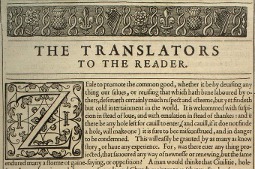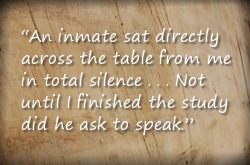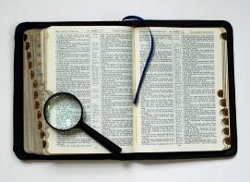Is the sin of Homosexuality something that is beyond God's power to change?
Poll Results
Is the sin of Homosexuality something that is beyond God’s power to change?
Yes, Homosexuals can never truly be freed from their homosexual tendencies. Votes: 0
No, God can transform any person, and make them a new creation. Votes: 13
Discussion
The Preface, Part 4: Marginal Notes in the King James Version
 Republished with permission from Theologically Driven. (See also: previous installments in this series.)
Republished with permission from Theologically Driven. (See also: previous installments in this series.)
The King James-only view argues that only the 1611 KJV is the Word of God in English. All other versions or translations are so corrupt that they are not to be used, nor be appealed to as the Word of God. Most KJV-only advocates contend that the printed Greek text from which the KJV was translated, commonly called the Textus Receptus (TR), is inspired and inerrant, and the KJV is the only translation that accurately translates the TR. But this is not true. The New King James Version (NKJV) is also translated from the TR. Being TR based, the NKJV cannot so easily be discounted by KJV-only proponents. Therefore, they seek to find other ways to disqualify the NKJV.
A common complaint against the NKJV by KJV-only advocates is the use of notes provided by the translators. For example, D. A. Waite says:
The diabolical nature of the New King James Version shows itself in their printing all the various readings of the Greek text in the footnotes. They print all sides and take their stand in favor of none of them. By so doing, they confuse the readers. The editors have made no decision as to what God’s Words really are (Defending the King James Bible, p. 125).
William P. Grady sounds a similar warning:
Discussion
The Jail Stalker

My pastoral colleague, Paul, and I have ministered for a number of years to inmates at the Shakopee Jail. The weekly Bible studies we lead there did not originate from a strategic vision developed in the sterile confines of a board room. They sprang from the messy reality that a new attendee of our church had taken up residence at the jail for a season. Although we did not know him well, he had sent word that he would appreciate a visit. The look on his haggard face and the tears of appreciation that welled up in his tough-guy eyes were all it took for me to keep going back long after he was released and living in another state.
Jesus’ prophecy concerning God’s final commendation of those who ministered in life to vulnerable people took on new meaning: “I was in prison and you visited to me” (Matt. 25:36). In Jesus’ vignette those receiving this divine accreditation are incredulous: “When did we see you sick or in prison?” they ask God (Matt. 25:39). “And the King will answer them, ‘Truly I say to you, as you did it to one of the least of these my brothers, you did it to me’ ” (Matt. 25:40). God takes special interest in prisoners.
Yet our ministry to these marginalized members of society is far from a one-way extension of mercy. As is standard in Christ’s kingdom, those who give much receive more. Any aid we render to inmates is paid back many times over in lessons learned and skin-tingling evidences that God stalks the darkest recesses of our world.
Discussion
Cremation for the Believer
A couple in our extended family has experienced a sudden, completely unforseen death in their young family. During our communication back and forth, they shared with me that the body will be cremated. I was surprised. No other member of our extended family has chosen cremation.
Discussion
Food offered to idols...
Can a true Christian practice Yoga in good conscience, knowing this???
http://www.youtube.com/watch?v=5-SQr-gNldE&feature=related
Is it lawful to partake of food offered to idols?
Discussion
Rules of Affinity, Part 2: The Positive Application
 Posted courtesy of Dr Reluctant.
Posted courtesy of Dr Reluctant.
(Editor’s note: Part 2 assumes you have read Part 1: Rules of Affinity—Classifying Relationships between Doctrines and Their Supporting Texts)
These “rules” are only rules to the degree that one allows them be rules or ground-rules. One’s hermeneutics will tend to determine how friendly he will be toward these ideas. All the doctrines listed below can be established via C1 (category one) or C2 (category two) formulations, with some C3’s supporting. Even if, due to a blind spot, I may be inferring more than is there in the text, I can be corrected with these same rules. None of the major biblical doctrines are established with C4’s or C5’s!
Well-known Christian doctrines
The propositions below are examples of what might be predicated of each doctrine in an evangelical statement of faith.
The inspiration of Scripture—Proposition: The Scriptures come from the God who breathed them out and caused them to be inscripturated through men who were ‘borne along’ by the Spirit. That is what makes them Scripture.—2 Tim. 3:16; 2 Pet. 1:20-21; Matt. 4:4; Jn. 17:17; Psa. 119:89-91
Inerrancy—Proposition: The inspired Scriptures are the Word of God before they are the words of men. They must be up to the job of transmitting truth from He who is True. This truth will be as reliable in one area of knowledge as in any other, even if exact precision is not necessary.—2 Tim. 3:16; Psa. 12:6; Jn. 17:17; 2 Pet. 1:19-21
Discussion
Original Sin: Your View
Poll Results
Original Sin: Your View
Pelagian: Adam’s sin does not affect us directly, but a bad example and a cursed environment Votes: 0
Federal View: Human race affected by Adam’s sin and thus cursed, even though Adam sinned alone Votes: 6
Augustinian View: We sinned in Adam Votes: 5
Combination of 2 or more of the above Votes: 3
Other Votes: 2
Discussion
The Preface and the KJV's Exclusivity and Authority
 Republished with permission from Theologically Driven.
Republished with permission from Theologically Driven.
Is Only the King James Version the Word of God?
The King James-only movement refuses to recognize any other translation in English as the Word of God. As I noted in previous posts here and here, the Preface to the 1611 KJV is an embarrassment to the KJV-only position because in the Preface the translators themselves absolutely reject the erroneous idea that any translation has such a unique position. Unlike modern KJV-only advocates, the translators themselves admired the work of previous translators of the English Bible.
And to the same effect say we, that we are so far off from condemning any of their labours that travailed before us in this kind, either in this land, or beyond sea, either in King Henry’s time, or King Edward’s, (if there were any translation, or correction of a translation, in his time) or Queen Elizabeth’s of ever renowned memory, that we acknowledge them to have been raised up of God for the building and furnishing of his Church, and that they deserve to be had of us and of posterity in everlasting remembrance.
Discussion